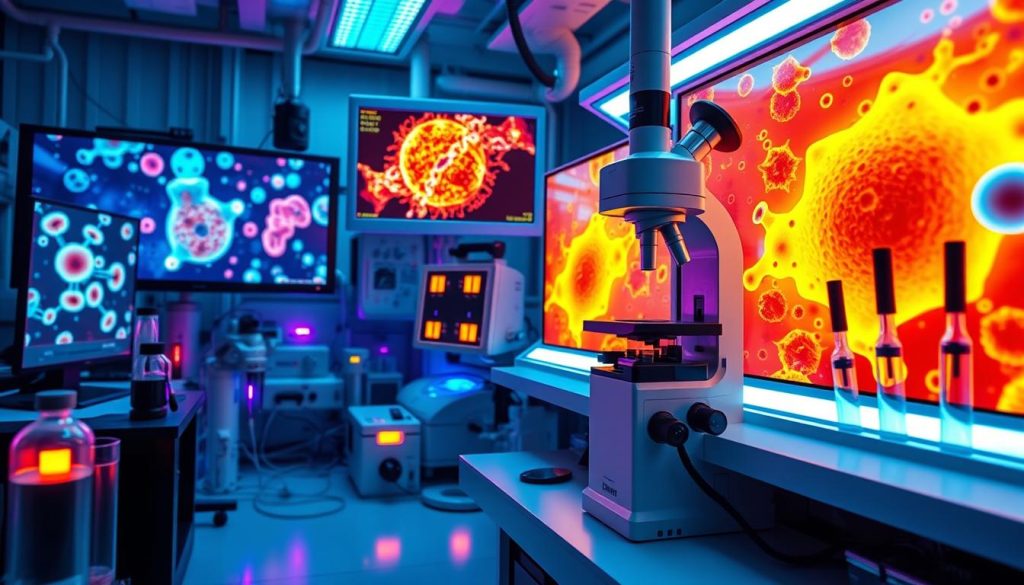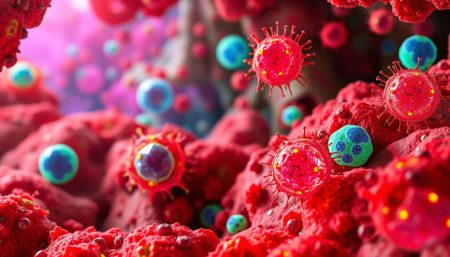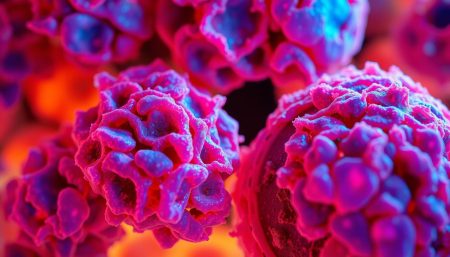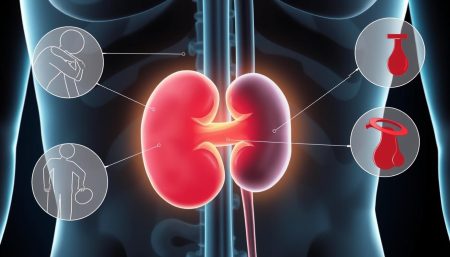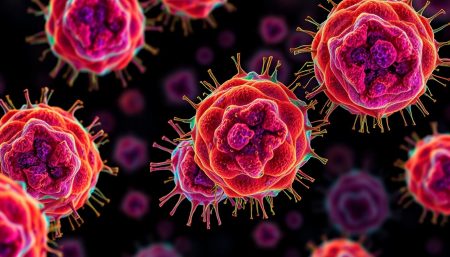In the fight against blood cancers like leukemia and lymphoma, a new immunotherapy called CD19 CAR T cell therapy shines as a beacon of hope. This cutting-edge treatment uses a patient’s own immune system to target B-cell malignancies with great precision and success. CD19 CAR T cell therapy marks a major step forward in personalized medicine. It reprograms a patient’s T cells to attack and destroy cancer cells with the CD19 antigen. This method is precise, reducing harm to healthy cells. It improves survival rates and enhances the quality of life for those with B-cell malignancies.
As research keeps advancing, CD19 CAR T cell therapy promises to change the face of blood cancer treatment. It offers long-term remission and could even cure some patients. This innovative immunotherapy is set to transform the lives of many fighting these severe diseases.
Understanding CD19 CAR T Cell Therapy
CD19 CAR T cell therapy is a new way to treat blood cancers. It uses the body’s immune system to fight cancer. Knowing how it works helps patients and their families make good choices about treatment.
What is Chimeric Antigen Receptor (CAR) T Cell Therapy?
Chimeric antigen receptor (CAR) T cell therapy is a type of cellular immunotherapy. It changes a patient’s T cells to attack cancer cells. T cells are important for fighting off infections.
In this therapy, T cells are taken from the patient. They are then changed in a lab to find and kill cancer cells. After that, they are put back into the patient.
How CD19 CAR T Cell Therapy Works
CD19 CAR T cell therapy targets the CD19 antigen on B-cell cancers. It involves several steps:
- T cell collection: T cells are taken from the patient.
- Genetic modification: The T cells are changed in a lab to find CD19.
- Cell expansion: The changed T cells are grown to make more.
- Lymphodepletion: The patient gets chemotherapy to make room for the T cells.
- CAR T cell infusion: The modified T cells are put back into the patient.
The table below shows how CD19 CAR T cell therapy is different from other cancer treatments:
| Feature | CD19 CAR T Cell Therapy | Traditional Cancer Treatments |
|---|---|---|
| Approach | Targeted, using patient’s own immune cells | Systemic, affecting both cancer and healthy cells |
| Specificity | Highly specific to CD19-expressing cancer cells | Non-specific, affecting various rapidly dividing cells |
| Duration | Single infusion, with long-term effects | Multiple cycles, with short-term effects |
“CD19 CAR T cell therapy is a big step forward in fighting blood cancers. It gives hope to those who have tried other treatments.”
Understanding CD19 CAR T cell therapy helps patients and doctors make informed choices. It’s a new way to fight cancer.
The Role of CD19 in B-Cell Malignancies
CD19 is a protein found on B cells. It’s key in B-cell malignancies like leukemia and lymphoma. These cancers happen when B cells grow too much and fill the blood, bone marrow, and lymph nodes.
CD19 on cancerous B cells makes cd19 car t cell therapy a great option. This therapy targets CD19 to kill cancer cells safely. It gives hope to those with advanced or relapsed leukemia and lymphoma.
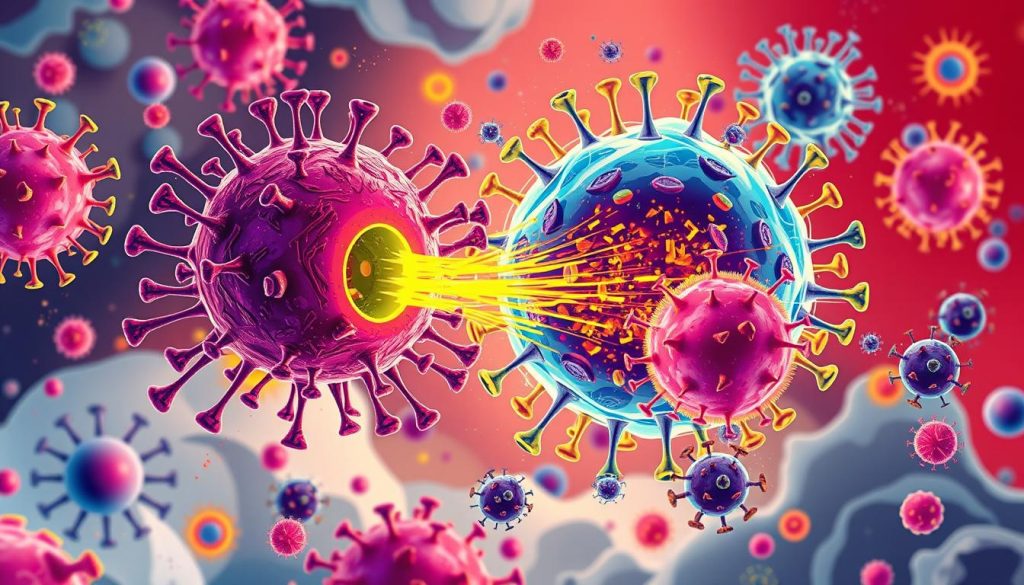
CD19 is important because it’s always there in B-cell development. This lets cd19 car t cell therapy attack cancerous B cells at any stage. It’s a big help in treating lymphoma and other B-cell disorders.
“CD19 is a key biomarker in the diagnosis and treatment of B-cell malignancies. Its consistent expression on cancerous B cells makes it an ideal target for CAR T cell therapy, providing hope for patients with advanced or relapsed forms of leukemia and lymphoma.”
The table below shows how CD19 affects B-cell malignancies and cd19 car t cell therapy:
| B-Cell Malignancy | CD19 Expression | Potential Impact of CD19 CAR T Cell Therapy |
|---|---|---|
| Acute Lymphoblastic Leukemia (ALL) | High | Effective treatment for relapsed or refractory ALL |
| Chronic Lymphocytic Leukemia (CLL) | High | Promising option for patients with advanced or high-risk CLL |
| Non-Hodgkin Lymphoma (NHL) | Variable | Effective for certain subtypes of NHL, such as diffuse large B-cell lymphoma |
Research is making cd19 car t cell therapy a game-changer for lymphoma treatment. It’s bringing new hope to those fighting these tough diseases.
Advantages of CD19 CAR T Cell Therapy
CD19 CAR T cell therapy is a game-changer for cancer treatment. It uses the body’s immune system to fight cancer. This method is targeted, personalized, and can offer long-term results.
Targeted Approach to Cancer Treatment
This therapy is special because it targets cancer cells directly. It uses T cells to find and destroy cancer cells with the CD19 antigen. This means it’s less likely to harm healthy cells, unlike chemotherapy and radiation.
Personalized Medicine
CD19 CAR T cell therapy is all about personalization. It starts with taking the patient’s T cells, modifying them, and then putting them back in. This makes the treatment unique to each person, boosting its effectiveness.
| Traditional Cancer Treatments | CD19 CAR T Cell Therapy |
|---|---|
| Non-specific, affecting both cancerous and healthy cells | Targeted to CD19-expressing cancer cells |
| One-size-fits-all approach | Personalized with patient’s own immune cells |
| Often results in short-term responses | Potential for long-term remission |
Potential for Long-Term Remission
The most promising thing about CD19 CAR T cell therapy is its chance for long-term remission. Some patients have stayed cancer-free for years after just one treatment.
“CAR T cell therapy has given me a second chance at life. After multiple rounds of chemotherapy and a stem cell transplant failed, I thought I was out of options. But thanks to this incredible treatment, I’ve been cancer-free for over two years now.” – Sarah, lymphoma survivor
This therapy offers a chance for lasting results and even cures for some blood cancers. As it gets better, more people might get to experience its life-saving benefits.
Clinical Trials and Success Stories
The results from clinical trials show how well CD19 CAR T cell therapy works against B-cell cancers. These trials prove the treatment’s science and give hope to those fighting blood cancers.
Groundbreaking Clinical Trial Results
Many key trials have shown CD19 CAR T cell therapy’s high treatment success rates. The ELIANA trial, for example, looked at kids and young adults with B-cell ALL. The findings were amazing:
| Response Rate | Complete Remission | Median Duration of Remission |
|---|---|---|
| 81% | 60% | Not reached at 6 months |
Trials for other B-cell cancers, like DLBCL and MCL, also showed great results. These findings make CD19 CAR T cell therapy a major cancer treatment breakthrough.
Real-Life Patient Experiences
The stories of patients who’ve been helped by CD19 CAR T cell therapy are truly inspiring. Patient experiences show the real-life impact of this medical breakthrough.
“I was told I had just months to live, but CAR T cell therapy gave me a second chance at life. I’ve been cancer-free for over a year now, and I’m grateful every day.” – Emily, a lymphoma survivor

These stories highlight the therapy’s ability to offer long-term remission and better life quality. As more patients share their stories, hope and awareness grow.
FDA Approval of CD19 CAR T Cell Therapies
The U.S. Food and Drug Administration (FDA) has approved several cd19 car t cell therapy treatments. This is a big step in the fight against certain blood cancers. These therapies have shown great results in clinical trials, giving hope to those who have tried other treatments.
In August 2017, the FDA approved Kymriah (tisagenlecleucel) for kids and young adults with B-cell acute lymphoblastic leukemia (ALL). Just two months later, in October 2017, the FDA approved Yescarta (axicabtagene ciloleucel) for adults with relapsed or refractory large B-cell lymphoma, including DLBCL.
The fda approval of these therapies was based on their impressive performance in clinical trials:
| Therapy | Clinical Trial Results |
|---|---|
| Kymriah | 83% overall remission rate in pediatric and young adult patients with relapsed or refractory B-cell ALL |
| Yescarta | 51% complete response rate in adult patients with relapsed or refractory large B-cell lymphoma |
The FDA’s decision to approve these cd19 car t cell therapy treatments has made them more widely available to patients in need. As Dr. Scott Gottlieb, former FDA Commissioner, stated:
“We’re entering a new frontier in medical innovation with the ability to reprogram a patient’s own cells to attack a deadly cancer. New technologies such as gene and cell therapies hold out the promise to transform medicine and create a turning point in our ability to treat and even cure many intractable illnesses.”
With the fda approval of Kymriah and Yescarta, patients with certain types of leukemia and lymphoma now have a new treatment option. This option uses the power of their own immune system to fight cancer. As research continues, it is hoped that cd19 car t cell therapy will be approved for more cancers, bringing hope to more patients and their families.
Eligible Candidates for CD19 CAR T Cell Therapy
CD19 CAR T cell therapy is a new hope for some blood cancer patients. But, not everyone can get this treatment. Doctors look at many things to decide who can get it. These include the type of blood cancer, how advanced it is, and what treatments the patient has tried before.
Types of Blood Cancers Treated
CD19 CAR T cell therapy is approved for certain blood cancers. These include:
- Acute lymphoblastic leukemia (ALL)
- Diffuse large B-cell lymphoma (DLBCL)
- Primary mediastinal large B-cell lymphoma
- Follicular lymphoma
- Mantle cell lymphoma
These cancers grow from B cells, a type of white blood cell. CAR T cell therapy targets CD19 on these cells. This helps kill the cancer cells without harming healthy ones.
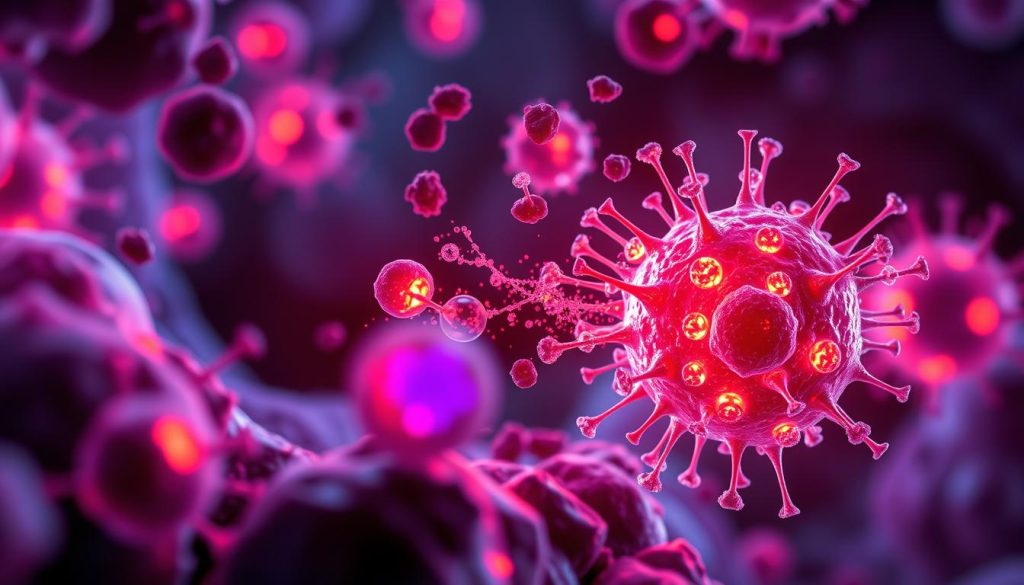
Patient Selection Criteria
To get CD19 CAR T cell therapy, patients must meet certain criteria. These include:
- Age: It’s mainly for adults, but some trials are for kids too.
- Disease status: Patients must have cancer that came back or didn’t respond to other treatments.
- Previous treatments: They’ve tried many treatments without getting better for long.
- Overall health: Patients need to be fairly healthy to handle the therapy’s side effects.
A team of doctors carefully chooses who can get this therapy. They look at the patient’s history, do tests, and talk about the therapy’s risks and benefits. Choosing the right patients is key to good results and safety.
The CD19 CAR T Cell Therapy Process
CD19 CAR T cell therapy is a detailed and tailored treatment. It involves several important steps. From collecting a patient’s T cells to infusing genetically modified CAR T cells, each step is vital for success.
T Cell Collection and Genetic Modification
The first step is collecting the patient’s T cells through leukapheresis. This process separates and collects white blood cells, including T cells, from the blood. The T cells are then taken to a lab for genetic modification. They are made to express a chimeric antigen receptor (CAR) that targets CD19 on cancer cells.
Lymphodepletion and CAR T Cell Infusion
Before getting the CAR T cells, patients have lymphodepleting chemotherapy. This makes room for the CAR T cells to grow and fight cancer cells. After this, the patient gets a single infusion of their modified CAR T cells. These cells are now ready to find and attack cancer cells with the CD19 protein.
“The infusion of CAR T cells is a relatively simple process, similar to a blood transfusion, but it represents the culmination of weeks of preparation and marks the beginning of a new phase in the patient’s cancer treatment journey.”
Monitoring and Follow-Up Care
After the car t cell infusion, patients are watched closely for side effects or complications. This follow-up care is key to keeping patients safe and healthy. Regular visits and checks help doctors see how the treatment is working and act fast if needed.
The CD19 CAR T cell therapy shows great progress in cancer treatment and personalized medicine. It uses a patient’s immune system to fight cancer. This therapy gives hope to those with B-cell malignancies.
Potential Side Effects and Management
CD19 CAR T cell therapy is a breakthrough in treating blood cancers. Yet, it’s vital for patients and families to know about possible side effects. The most common issues are cytokine release syndrome (CRS) and neurotoxicity.
CRS happens when the immune system overreacts, releasing cytokines into the blood. Symptoms can range from mild flu-like symptoms to severe issues like high fever and breathing trouble. It’s critical to quickly spot and manage CRS to keep patients safe and prevent long-term harm.

Neurotoxicity can cause confusion, seizures, and other brain-related problems. These symptoms usually show up within weeks after treatment. A skilled healthcare team closely watches for these signs, and most cases can be treated with supportive care and medication.
Patients getting CD19 CAR T cell therapy are watched closely in the hospital for weeks. Healthcare experts are ready to spot and treat CRS or neurotoxicity quickly. This ensures patients get the right care right away.
“The key to successfully managing side effects lies in early detection and intervention. Our team works tirelessly to ensure that every patient receives personalized care and support throughout their treatment journey.” – Dr. Emily Thompson, CAR T cell therapy specialist
While side effects can be concerning, most patients face manageable symptoms and achieve long-term remission. With a dedicated healthcare team, patients can overcome the challenges of CD19 CAR T cell therapy. This brings hope in their battle against cancer.
cd19 car t cell therapy vs. Traditional Cancer Treatments
Patients and their families often face a choice in treating blood cancers. They can choose between traditional treatments and CD19 CAR T cell therapy. Traditional methods like chemotherapy, radiation, and stem cell transplantation have been used for years. But CD19 CAR T cell therapy is a new, targeted approach that might be more effective.
Chemotherapy and Radiation
Chemotherapy and radiation are common treatments for cancer. Chemotherapy kills cancer cells all over the body with drugs. Radiation targets specific areas with high-energy beams. But these treatments can harm healthy cells too, causing side effects.
CD19 CAR T cell therapy, on the other hand, targets cancer cells with precision. It uses the patient’s own T cells to fight cancer. This approach might lead to fewer side effects and a better quality of life.
Stem Cell Transplantation
Stem cell transplantation, or bone marrow transplant, is another treatment for blood cancers. It replaces the patient’s diseased bone marrow with healthy stem cells. This can be life-saving but comes with risks like infection and graft-versus-host disease.
CD19 CAR T cell therapy offers a different option. It uses the patient’s own T cells to fight cancer, avoiding the need for a donor. This reduces the risk of graft-versus-host disease. Plus, it has shown promise in achieving long-term remission in some patients.
While traditional treatments like chemotherapy, radiation, and stem cell transplantation are important, CD19 CAR T cell therapy is a new hope. As research grows, patients and doctors will have more options for effective and personalized treatments.
Ongoing Research and Future Developments
CD19 CAR T cell therapy is showing great success in treating blood cancers. Researchers are working hard to make it even better. They aim to improve its effectiveness and use it for more types of cancer. Ongoing research is focused on several key areas to enhance this cancer treatment.

Combining CD19 CAR T Cells with Other Therapies
Researchers are looking into combination therapies with CD19 CAR T cells. They want to see how these cells work with other treatments like chemotherapy or targeted drugs. This could lead to better results and fewer relapses for patients.
Expanding to Other Types of Cancer
Another exciting area is using CD19 CAR T cell therapy for solid tumors and other cancers. While it’s been a hit for blood cancers, scientists are exploring its use for other types. This could give hope to patients with few treatment options.
“The success of CD19 CAR T cell therapy in blood cancers has sparked tremendous interest in adapting this approach to other types of cancer. We’re just scratching the surface of what’s possible with this technology.” – Dr. Sarah Johnson, oncologist and CAR T cell researcher
Improving Safety and Efficacy
Researchers are also working on making CD19 CAR T cell therapy safer and more effective. They’re improving the genetic engineering and manufacturing process. They also want to find better ways to manage side effects. This will help more patients benefit from the therapy.
As research continues, the future of CD19 CAR T cell therapy looks bright. It could lead to new treatments and better outcomes for cancer patients. With ongoing innovation, this therapy offers new hope in the fight against cancer.
Accessibility and Cost of CD19 CAR T Cell Therapy
CD19 CAR T cell therapy is a game-changer for some blood cancers. But, it’s pricey and not easy to get for many. The treatment is custom-made for each patient, adding to the cost. It can cost hundreds of thousands of dollars, making it one of the priciest cancer treatments.
Insurance coverage for this therapy varies. Some private insurers and government programs like Medicare and Medicaid might cover it. But, getting approved can take a long time, adding stress and financial worry for patients and their families.
There are efforts to make CD19 CAR T cell therapy more accessible. Researchers are looking to make the treatment cheaper and easier to get. They’re also working on “off-the-shelf” CAR T cell therapies that could be available for more patients. Plus, there are programs to help with the cost for those who qualify.
Despite the hurdles, the medical community sees the huge promise of CD19 CAR T cell therapy. They’re working hard to make it more available. As research and healthcare policies improve, more patients might get to try this life-changing treatment without facing huge financial challenges.
Patient Support and Resources
Going through CD19 CAR T cell therapy can be tough for patients and their families. But, there are many resources to help during this time.
Emotional Support for Patients and Families
Dealing with cancer and treatment can be very hard emotionally. Many places that offer CD19 CAR T cell therapy have support groups and counseling. These help patients and families connect with others who understand their feelings.
Groups like the Leukemia & Lymphoma Society and the American Cancer Society have online forums and helplines. They offer support and advice from experts. Hospitals also have social workers and psychologists to help patients emotionally.
“Having a strong support system was key during my CD19 CAR T cell therapy. My family, friends, and the hospital’s counseling kept me hopeful and positive.”
– Sarah, a CD19 CAR T cell therapy patient
Financial Assistance Programs
CD19 CAR T cell therapy can be very expensive. But, there are programs to help with these costs:
| Program | Description |
|---|---|
| Manufacturer Patient Assistance Programs | Companies that make CAR T cell therapies have programs to help with costs for some patients. |
| Non-Profit Organizations | Groups like the Patient Access Network Foundation and the Cancer Financial Assistance Coalition offer grants for treatment costs. |
| Government Assistance | Medicaid and Medicare might help pay for CD19 CAR T cell therapy for some patients. |
Patients should talk to their healthcare team and social workers about these options. Using these resources can make the emotional and financial challenges of CD19 CAR T cell therapy easier to handle.
The Role of Healthcare Providers in CD19 CAR T Cell Therapy
Healthcare providers are key to the success of CD19 CAR T cell therapy. A team of oncologists, nurses, and support staff work together. They provide complete care, making sure patients get the best treatment and support.
Good communication and patient education are important. Healthcare providers must explain the therapy’s benefits and risks. This helps patients make informed choices about their treatment.
They also watch patients closely during and after the therapy. Managing side effects and providing support are part of their job. Their expertise and dedication offer hope and support to patients.
FAQ
Q: What is CD19 CAR T cell therapy?
A: CD19 CAR T cell therapy is a new way to fight cancer. It uses a patient’s own immune cells to attack cancer cells. These cells have a special protein called CD19, found in some cancers like leukemia and lymphoma.
Q: How does CD19 CAR T cell therapy work?
A: First, doctors take a patient’s T cells. Then, they make these cells find and kill cancer cells. This is done by adding special receptors to the T cells.
Q: What are the advantages of CD19 CAR T cell therapy over traditional cancer treatments?
A: This therapy is more precise and doesn’t harm healthy cells as much. It’s made just for the patient, using their own cells. It also has a good chance of lasting results, even when other treatments fail.
Q: What types of blood cancers can be treated with CD19 CAR T cell therapy?
A: It’s approved for some types of leukemia and lymphomas. This includes acute lymphoblastic leukemia (ALL) and certain lymphomas like DLBCL and follicular lymphoma.
Q: What are the possible side effects of CD19 CAR T cell therapy?
A: Side effects can include cytokine release syndrome (CRS) and neurotoxicity. CRS can cause fever, low blood pressure, and trouble breathing. Neurotoxicity might lead to confusion, tremors, or seizures. A team of experts closely watches and manages these side effects.
Q: How accessible is CD19 CAR T cell therapy, and is it covered by insurance?
A: This therapy is expensive but FDA-approved. More insurance plans now cover it for those who qualify. There are also programs to help with the cost of treatment.
Q: What ongoing research is being conducted to improve CD19 CAR T cell therapy?
A: Scientists are working to make this therapy better. They’re looking to combine it with other treatments and use it for more cancers. They also aim to make it safer and more effective through new genetic engineering and manufacturing methods.












